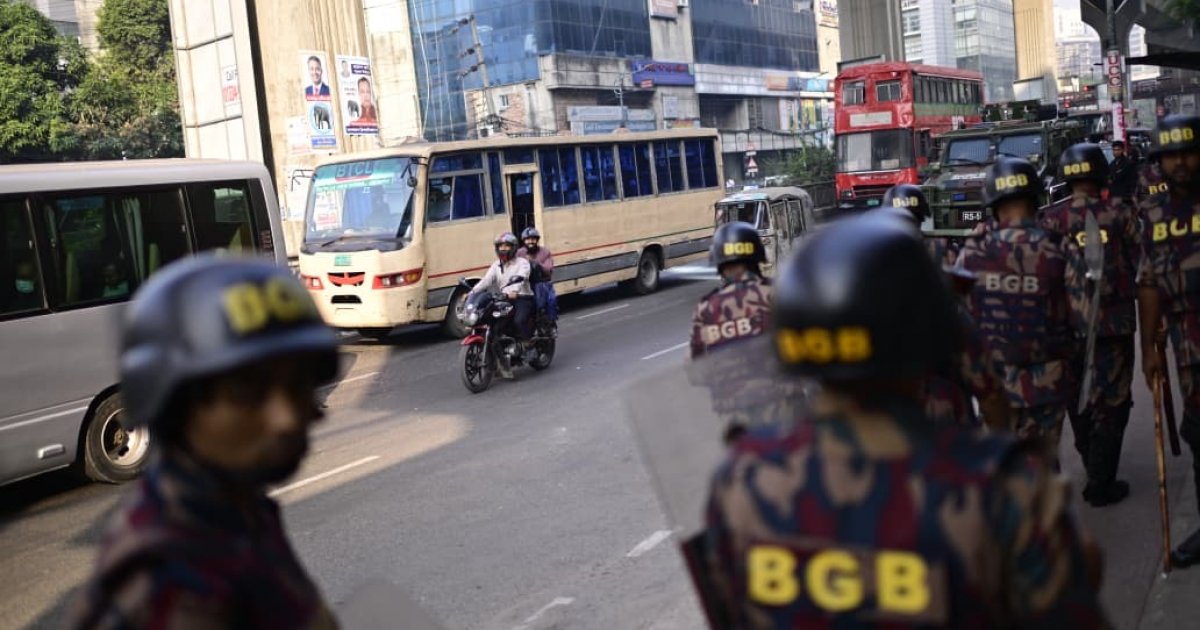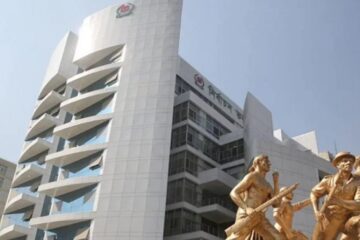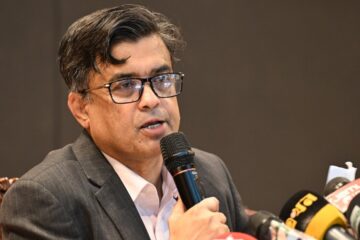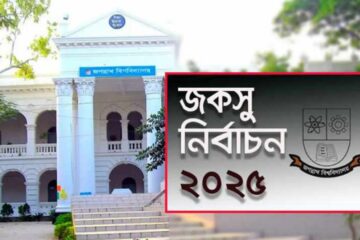A nationwide “lockdown” called by the banned Awami League failed to gain large-scale public traction Thursday, triggering scattered arson attacks, road blockades and vandalism across several districts, as tensions rise ahead of the war-crimes verdict against former prime minister Sheikh Hasina.
The Awami League, prohibited from political activity since its ouster last year, urged supporters via online channels to enforce a shutdown in protest of the ongoing trial.
Hasina, now in exile in India, is charged with crimes against humanity for the deadly crackdown on the 2024 student uprising that ended her 15-year rule.
She has rejected the tribunal as a “kangaroo court” and refused legal representation.
Schools in Dhaka and other cities moved classes online in anticipation of unrest, while businesses and transport operators braced for disruption.
Dhaka under lockdown-style security
The capital remained calm under an extensive security clampdown.
Some 60,000 personnel from police, RAB and other agencies were deployed nationwide, with troops positioned at key points in Dhaka, including around the special tribunal where Hasina’s verdict proceedings are underway.
Streets were unusually empty as residents stayed home and public transport thinned.
Aside from minor vandalism earlier in the week, no significant procession materialized in the capital.
The capital saw a flashpoint when protesters set fire to the Awami League’s party office in Gulistan around midday.
Demonstrators torched abandoned furniture inside and vandalized sculptures outside, police confirmed.
The incident unfolded alongside sit-ins by Bangladesh Islami Chhatra Shibir, Julai Joddha Sangsad and Inqilab Mancha, calling for the maximum punishment for Hasina and a permanent ban on her party.
During the unrest, two suspected Chhatra League members were detained.
The surrounding stadium and secretariat areas had been sealed off since morning, forcing pedestrians to walk long detours through police barricades.
Tensions escalated when a rickshaw-puller, Mohammad Babu of Barisal, was beaten unconscious by protesters who accused him of supporting the Awami League.
Witnesses said the assault unfolded in front of police.
In a separate incident at Dhanmondi 32, a woman was attacked for shouting “Joy Bangla” near the Bangabandhu residence; police intervened and rescued her.
Dhaka Metropolitan Police spokesperson Md Talebur Rahman said security forces had “taken necessary measures” and urged residents not to panic, even as crude bombs and arson in recent days rattled the capital.
Police also reported detaining at least 31 suspects in Dhaka and 33 more in Kurigram in pre-emptive raids for allegedly plotting violence linked to the planned lockdown.
Arson, blockades reported across districts
Violence began overnight when unidentified attackers torched vehicles in at least seven locations, including Dhaka, Shariatpur, Tangail, Munshiganj, Jashore and Gopalganj.
A passenger bus in Tangail was firebombed mid-journey, though passengers escaped unharmed.
In Brahmanbaria, arsonists set fire to a section of railway track, halting two inter-city trains before crews extinguished the flames.
By dawn, Awami League supporters and affiliates mounted road blockades on several highways.
In Shariatpur, activists occupied a 28-kilometre stretch of the Dhaka–Bhanga expressway, burning tyres, felling trees and exploding crude bombs near police vehicles.
The standoff lasted four hours before officers dispersed the crowd; one constable suffered minor injuries.
In Faridpur, protesters shut down the Dhaka–Khulna Highway for five hours using burning barricades.
Several long-distance buses were attacked or set ablaze overnight, prompting inter-district transport suspensions that stranded hundreds.
In southern Barguna, alleged Chhatra League activists set fire to a July uprising memorial and attempted to block roads. All outbound buses were cancelled for the day.
Political reactions split along old fault lines
Awami League leaders in exile denied orchestrating the violence and insisted the protest was intended to be peaceful.
They accused the interim government of weaponizing Hasina’s trial and cracking down on their supporters.
Rival parties portrayed the low turnout as a public rejection of the Awami League.
Jamaat-e-Islami Secretary General Mia Golam Parwar said the nation had “resisted Awami fascists,” while BNP leader Amir Khasru Mahmud Chowdhury argued the Awami League was “no longer a factor” in the political landscape.
He urged authorities to prevent any group from disrupting the election timeline, with national polls and the July Charter referendum weeks away.
Public anxiety persists
Shops, offices and traffic thinned across major cities as residents moved cautiously, shaken by pre-dawn explosions and fires reminiscent of earlier bouts of political violence.
“We are hearing all kinds of rumours, but we just hope things stay peaceful,” said a Dhaka office worker.
By evening, authorities said order had been restored nationwide, though vehicles, roads and public infrastructure suffered extensive damage.
Security will remain on high alert as the country approaches Hasina’s November 17 verdict.



